#Jeanne de cousin
Note
Do you see a similarity between Margery Tyrell (as well as Elinor Tyrell, Megga Tyrell, and Alla Tyrell) being put on trail and the trail of the daughter's in law of King Philip the Fair of France (specifically as described in The Accursed Kings), I was reading the Iron King a few weeks ago and it made me wonder if there was a connection as GRRM is a fan of the The Accursed Kings.
Me, think about a connection between ASOIAF and The Accursed Kings? Now when have I ever done that before?
(It me, it always me. Also long, more under the cut.)
Absolutely, I 100% believe that GRRM partially (emphasis on partially) based the supposed love affairs of Margaery and her cousins on the Tour de Nesle Affair as depicted in The Accursed Kings - specifically the first novel of the series, The Iron King. To very briefly summarize, the Tour de Nesle affair centers on the three daughters-in-law of King Philip IV of France: Marguerite of Burgundy, wife of Philip’s eldest son, Louis (and Queen of Navarre, since Louis is King of Navarre in his own right); Marguerite’s cousin Jeanne of Burgundy, wife of the king’s second son, Philip; and Jeanne’s sister (and, naturally, Marguerite’s cousin) Blanche, wife of the king’s third son, Charles. Marguerite and Blanche engage in extramarital sexual affairs with two courtiers, the brothers Philippe and Gautier d’Aunay, with Jeanne acting as facilitator and messenger for their trysts; the affair takes its name from the tower of the Hôtel-de-Nesle, the manor of the King of Navarre, where Marguerite and Blanche entertain their lovers. The affair is discovered by another French prince, Robert of Artois, and he and Philip IV’s daughter, Isabella, engineer a scheme to trap the princesses and expose them. Marguerite, Blanche, and Jeanne are subsequently caught and found guilty, the former two of adultery, the latter of aiding and abetting them; Marguerite and Blanche are imprisoned (the former until she is murdered, the latter until she dies, prematurely young and apparently insane), while Jeanne is likewise initially imprisoned but eventually freed by and reunited with her husband.
With respect to parallels between this story and the plot of AFFC, the Tour de Nesle affair and the affair Cersei invents for Margaery both involve several interrelated royal (or semi-royal) ladies. I mentioned above the princesses in The Iron King, who are called the “Princesses of Burgundy”: Marguerite is the daughter of the Duke of Burgundy, while her cousins Jeanne and Blanche are referred to as the “sisters of Burgundy”, daughters of the late Count of Burgundy. (Yes, the Duchy of Burgundy and County of Burgundy were at this time two separate political entities despite sharing a name). Likewise, the sexual scandal dreamed up by Cersei centers on four Tyrell girls at court, with one a queen: Queen Margaery, of course and three of her cousins, Megga, Elinor, and Alla. None of the Tyrell girls are sisters to any of the others, but all four are part of an extended Tyrell family, grouped together as “Tyrells” much as the three princesses of The Iron King are counted together by Robert of Artois as part of the “family of Burgundy”. In turn, just as Robert of Artois seeks to reveal the scandal specifically so that “[t]he whole family of Burgundy will be plunged up to the neck in the midden … [and] their inheritance will no longer be within reach of the Crown” - leaving that disputed inheritance open to Robert himself - so Cersei, furious at being “awash in roses”, dreams of framing Margaery for a crime of treason so serious that “even her own lord father must condemn her, or her shame becomes his own”.
Moreover, the parallel between these plots in The Iron King and AFFC is strengthened by the identities of the respective plotters. As I noted, one of the two chief architects of the plot against the princesses of Burgundy is Queen Isabella - daughter of King Philip IV of France, sister-in-law to the three princesses, and Queen of England as the wife of King Edward II. Just as Cersei is considered one of the most beautiful women in the Seven Kingdoms, inheriting the golden good looks of any number of Lannister antecedents, Isabella is often compared to her famously handsome father, Philip the Fair, sharing what Druon calls the king’s “legendary personal beauty”; a courtier of her father’s, Hughes de Bouville, even goes on to compliment Isabella in a later novel, The She-Wolf of France, by saying that Isabella had inherited “all [King Philip’s] beauty which was so impervious to time”. Yet The Iron King opens on Isabella by calling her “the loveless queen”, and it’s a description as fitting to Cersei as it is to the daughter of Philip IV. Just as Isabella is trapped in a miserable marriage to Edward II, so Cersei was trapped in a terrible marriage to King Robert Baratheon - marriages made by their respective fathers, for the political gains of their paternal families. Indeed, King Philip’s retort to Isabella’s complaints about her bad treatment at the hands of her husband - “I did not marry you to a man … but to a King. I did not sacrifice you by mistake” - seems like the sort of reply Tywin would have given to Cersei, having chosen to make his daughter queen and secure a future royal grandson despite privately dismissing Robert as a stupid oaf (to say nothing of Robert's years of abusing Cersei).
Likewise, both queens seek solace in their eldest sons, as well as their birth dynasties. Isabella is first shown approving that her baby son Edward’s first word was “want”, which Isabella calls “the speech of a king”; she also teaches her son that “he belongs to France as much as to England” and insists that he “get accustomed to the names of his relatives” and learn “that his grandfather, Philip the Fair, is King of France”. Isabella also surrounds herself with reminders of her French past: The Iron King opens with Isabella listening to a French poem, her most trusted lady-in-waiting is the French Jeanne de Joinville, and in a later novel, The She-Wolf of France, Isabella loses to her husband’s favorite a book of poetry by Marie of France. For her part, Cersei has made sure - or at least tried to make sure - that Joffrey was raised as a Lannister with no love for his Baratheon “father”; indeed, Cersei even likes to think of conceiving Joffrey with Jaime as an act of revenge against Robert while trapped at the home of Robert’s maternal family. Joffrey’s surcoat when he duels Robb at Winterfell shows the Lannister lion equal to the Baratheon stag, imagery he later makes his official standard when he becomes king, and he famously has in the first book a sword he proudly calls Lion’s Tooth; too, when he is married, the Lannister banners are displayed as equal to the Baratheon and Tyrell banners, underlining the Lannister importance in Joffrey’s reign.
Too, neither queen has much love for the eventual objects of their respective plotting. When Robert of Artois informs Isabella that the princesses of Burgundy “hate you”, Isabella replies that “[t]hough I don’t know why, it is true that as far as I am concerned, I never liked them from the start”; Robert then adds his opinion, that Isabella “didn’t like them because they’re false, because they think of nothing but pleasure and have no sense of duty”. Indeed, Isabella’s longstanding dislike and distrust of her sisters-in-law seems reflected in her suspicions, apparently established before the beginning of The Iron King, that the princesses were already deceiving their husbands with extramarital lovers, seemingly heightened by the contrast to her own faithful (for her part) but loveless marriage - Isabella later tells Robert that “when I think of what I am denying myself, what I am giving up, then I know how lucky they are to have husbands who love them”, declaring “[t]hey must be punished, properly punished!”. Cersei’s distrust of Margaery, of course, can hardly be overstated, though in her case the origins of her hatred stem not from Margaery herself but rather Cersei’s paranoia about her, Cersei’s, own prophesied downfall at the hands of a younger and more beautiful queen. Convinced - probably at her ultimate cost - that her son’s (or sons’) eventual wife would fulfill the prophecy Maggy gave so many years prior, Cersei was predisposed to dislike, distrust, and deeply fear such a woman from the first
So both queens set out to denounce and bring down their royal in-laws through the revelation of a sexual scandal - the bombshell news that a queen and her aristocratic cousins have taken lovers in the persons of a few highborn courtiers. Both plots begin at their outset with the queens appointing spies in the households of the targets of the plots. Robert of Artois advises Isabella to request one of his allies be placed in Marguerite’s household as what he terms “a spy within the walls” - a successful move for Robert and Isabella's conspiracy, as not only does Marguerite (correctly) suspect Madame de Comminges for “always trailing about in her widow’s weeds”, but Robert also reveals that “[s]ince entering Marguerite’s service, Madame de Comminges sent him a report every day”. Cersei herself recruits Taena Merryweather from Margaery’s own household, blithely confirming Jaime’s suspicion that “[s]he’s informing on you to the little queen by saying that “Taena tells me everything Maid Margaery is doing”. Taena, for her part, tells Cersei what Cersei wants to hear, often dropping sexually suggestive hints supposedly about Margaery and her court, which encourage Cersei in her plot against Margaery.
Additionally, each queen faces the difficulty in singling out the rival queen in question given the presence of those rivals’ respective ladies. Robert of Artois complains that the princesses of Burgundy are “[c]lever wenches” because while Jeanne or Blanche often go to “pray” with Marguerite at the Tour de Nesle, each acts as an alibi for the other; as Robert concludes, “[o]ne woman at fault finds it difficult to defend herself”, but “[t]hree wicked harlots are a fortress”. Indeed, Taena Merryweather borrows almost the exact same castellated metaphor from Robert, claiming that Margaery’s “women are her castle walls”, as “[w]henever men are about, her septa will be with her, or her cousins”. This commentary from Taena inspires Cersei to ponder whether “[Margaery’s] ladies are part of it as well … [sic] not all of them, perhaps, but some” and then manipulate the confession of the Blue Bard to implicate Elinor, Megga, and Alla in the invented affair.
So in both cases, the groups of royal ladies are accused of fornication, with one lady from each excepted for a charge of what we might call criminal knowledge instead. In the case of the princesses of Burgundy, it is Jeanne who is deemed “guilty of complicity and culpable complacence”, while in the case of the Tyrells it is young Alla who is “charged with witnessing their shame [i.e. the supposed sexual relationships of Megga, Elinor, and Margaery] and helping them conceal it”. The distinction in charges notwithstanding, all the ladies are thereafter imprisoned, with both the Burgundy princesses and the Tyrell ladies stripped of their finery: at their judgment, the princesses of Burgundy kneel before the king “shaven and clothed in rough fustian” (so humbled that Jeanne and Blanche’s mother mistakes them for “three young monks”), and when Cersei visits the imprisoned Margaery, the young queen is dressed in “the roughspun shift of a novice sister”, with “[h]er locks … all a tangle”.
(It’s probably going too far to suggest that the planned roles for two courtier brothers in Cersei’s plot echoes the involvement of the d’Aunay brothers in the Tour de Nesle affair. After all, only Osney of the three Kettleblacks was supposed to have had sex with Margaery, and only Osney did have sex with Cersei, whatever Cersei would later claim to the High Septon.)
(I would be amused if GRRM named Margaery after Marguerite of Burgundy, knowing perhaps he would use her in an Accursed Kings-like plot in the future. However, I’m not saying this was necessarily or even likely the case: Margaery had been named since AGOT, after all long before the writing and publication of AFFC, and while GRRM’s affection for Maurice Druon and The Accursed Kings predates ASOIAF, there is no evidence that he planned this sort of parallel all the way back in 1996. The similarity of names may be simply an amusing coincidence, or even a retroactive realization by GRRM that he could use a similarly named character to star in a plot directly inspired by Marguerite of Burgundy’s story.)
Now, does this mean GRRM limited himself to The Iron King in creating this plot point for AFFC? Absolutely not, I would say. Indeed, I think it is very clear that GRRM also looked to the popular conception of the downfall of, and all but certainly false accusations leveled against, Anne Boleyn for further inspiration. Here, as in the popular imagination of Anne’s undoing, is a queen accused of sexual affairs with several male courtiers, who are imprisoned along with her (though note that according); here, as in the trial of Anne Boleyn, is a singer, supposedly among those accused lovers, tortured into a presumably false confession (and being the only accused lover to confess); here, as with Anne and George Boleyn, is a charge of incest against a queen and her brother, so obviously ludicrous in both cases that no contemporary takes it seriously; here, as with the arrests and subsequent release of Thomas Wyatt and Richard Page, are two courtiers seemingly accused of the same crime, but expected to be freed in order to demonstrate the guilt of the others. It’s an obvious but important point that GRRM does not need to borrow only to one point of inspiration, fictional or historical (or, rather, what he imagines as historical), for any given narrative he wants to write. Drawing connections between The Iron King and the plot against Margaery and her cousins no more invalidates connections between that same plot and the popular conception of Anne Boleyn’s downfall than comparing, say, Baelor to Louis IX of France (including the latter’s depiction in The Accursed Kings) invalidates comparisons between Baelor and Henry VI of England.
This last point extends to Cersei herself as well. While I definitely believe GRRM borrowed elements from Isabella of France for Cersei, I have also argued, and still believe, that Cersei also shared elements of her character and story with Marguerite of Burgundy herself. Parallels between Cersei and Marguerite should not nullify or undermine parallels between Margaery and Marguerite (specifically in this context of affairs/supposed affairs), any more than parallels between, say, Edward IV of England and Robert Baratheon should nullify or undermine parallels between that same King Edward and Robb Stark (specifically in the context of a secret marriage with no apparent political benefit). GRRM is not required to neatly match one for one a character in his universe to a historical or fictional figure, nor would I think we as readers would want him to; it would be a pretty boring story if he simply copy pasted figures from extant works or history and swapped their names for those he created.
Plus, I think Margaery and her cousins are pretty likely to come out of their trials much better than the princesses of Burgundy did with theirs. Most obviously, as even the High Septon admitted, the case against the queen and her cousins is weak - as indeed it might be, given that Cersei invented the affair in the first place. Far from the d’Aunay boasting about their royal lovers by wearing the infamous purses given them by the princesses (and gifted to them by Queen Isabella, to catch the lovers with them), all of the supposed lovers of the Tyrell girls save the Blue Bard have denied the affair, and his testimony is denounced as “half-mad”. On a practical level, the High Septon surely knows the danger for him, and his position, of convicting Margaery, given that Osney reported on the crown of sparrows demanding Margaery’s release (news Cersei regards ruefully, since as she thinks “Margaery has been their little pet”). Add to that threat the presence of Mace at the head of his army, returned to the capital explicitly to see through his daughter’s trial, and the High Sparrow is playing with fire in truly trying to convict Margaery and her cousins.
35 notes
·
View notes
Text
(A while ago @apurpledust mentioned wanting to know more about Duroc's children, so here's what information I have)
Duroc and his wife, Maria de las Nieves Martínez de Hervas, had two children, both of whom died tragically young. (Hervas left instructions that her gravestone should be engraved with "To the unhappiest of mothers".)
Their first child, Napoléon Louis Sidoine Joseph Duroc, was born on 24 February 1811 in Paris. Named for the emperor and his two grandfathers (Claude Sidoine de Michel du Roc and José Martínez de Hervas), he lived for just over fourteen months. The infant’s health was never good; Duroc wrote to Bertrand in March 1812 that “[Hervas] is doing well but her son has been and always is ill”. (As Duroc’s biographer Danielle Meyrueix notes, when writing of his wife and child he habitually referred to “her son” rather than “our son”. Perhaps not the most engaged of fathers.) Napoléon died on 6 May 1812 at Maidières in Lorraine. The architect Pierre Fontaine, noting in his journal that Hervas had asked him to design a tomb for her lost son, wrote that the child had been “a few days older than the King of Rome and destined to enjoy at that prince’s side all the favor with which the Emperor honored his father.”
Their daughter Hortense Eugénie Nieves Duroc was born on 14 May 1812, eight days after the young Napoléon’s death. (In a letter, Duroc implied that the news of the boy’s death had been kept from Hervas, who was in Paris, to avoid imperiling her health.) Named for her godmother, Hortense de Beauharnais, she was baptized in January 1813 alongside the duke of Bassano's daughter. After Duroc’s death in May 1813, Napoleon transferred the duchy of Friuli to her, writing to Hervas that Hortense would be “assured of my constant protection”. He also remembered her in his will, leaving her a large sum of money and recommending, in one last attempt at matchmaking, that she marry Bessières’s son, the duke of Istria. Hortense’s aunt wrote in 1823 that “Hortense is perfectly sweet, she’s a rare child for her spirit and intelligence, who her poor father would have been happy to see so fine in all respects”. She died of pneumonia on 24 September 1829 after three days of illness, aged seventeen.

A 1933 biography of Charles-Nicolas Fabvier (Hervas’s second husband) identifies this painting by Jeanne-Elisabeth Chaudet as a young Hortense Duroc. It was sold at an auction a few years ago with the title “Young Embroideress”, so either the sitter’s identity has been lost since then or it may never have been Hortense at all.
Duroc’s long liaison with the dancer Emilie Bigottini may also have resulted in at least one child. Felix Bouvier, writing a biographical sketch of Bigottini in 1909, claimed that “children were born of this irregular union, a daughter and a son named Odilon”. However, Odilon (full name Pierre Dominique Jean Marie Odilon Michel du Roc), born in 1801, was the son of Duroc’s cousin Géraud Pierre Michel du Roc, the marquis de Brion. On Duroc’s death, Napoleon made Odilon a page in the imperial household. (This may have given rise to Bouvier’s claim, as it seems to have confused people at the time. Caulaincourt had been tasked with sorting out Duroc’s affairs, including a substantial amount of money for Bigottini, and Duroc’s sister Jeanne implied that he had gotten the wrong impression from one of Duroc’s requests: “On the subject of the allowance for little Odilon, M. the duke of Vicenza was misled…he took a step which pained me very much”.) As for the daughter, all I’ve been able to find so far is a remark from Laure Junot that “It was known that the count Armand de Fuentès had had a daughter with Mademoiselle Bigottini, and that Duroc was in the same position”.
46 notes
·
View notes
Text
Models Goal for 2024
Huh 116 (62 Left), not small but not nearly as big as I figured... Neat. Also these models aren't in any particular order.
I think I should be able to clear them fairly fast actually, we'll guess we'll see.
1. Coco Adel (RWBY)
2. Lisa Lavender (RWBY)
3. Gwen Darcy (RWBY)
4. Nebula Violette (RWBY)
5. Dew Gayl (RWBY)
6. Octavia Ember (RWBY)
7. Ariel Vasilias/ Neptune's Lawyer Mom (RWBY)
8. Star Sanzang/ Sun's Cousin (RWBY)
9. Comet Sanzang/ Sun's Cousin (RWBY) (Scrapped Character)
10. Iris Marilla/ Beacon 2nd Year (RWBY)
11. Tortuga/ Ace-Ops Dead Member (RWBY)
12. Rowena Sunnybrook/ Shade's Weapon Teacher (RWBY)
13. Humanoid Crocea Mors (RWBY)
14. Bianca Prisma (RWBY)
15. Roane Ashwood/ Flynt's (RWBY)
16. Ivy Thickety/ Sun's (RWBY)
17. Ruda Tilleroot (RWBY)
18. Atlas Milfs/ Jaune's Fan Club (RWBY)
19. Arslan Atlan/ Sun's (RWBY)
20. Oliver Harper/ Flynt's (RWBY)
21. Trifa/ White Fang Girl/ Mercury's (RWBY)
22. Sun Wukong (RWBY)
23. Mercury Black (RWBY)
24. Flynt Coal (RWBY)
25. Iona Rockshow (RWBY)
26. Sunset Shimmer (My Little Pony)
27. Starlight Glimmer (My Little Pony)
28. Celestia (My Little Pony)
29. Luna (My Little Pony)
30. Maud Pie (My Little Pony)
31. Apple Bloom (My Little Pony)
32. Sweetie Belle (My Little Pony)
33. Scootaloo (My Little Pony)
34. Trixie (My Little Pony)
35. Ember (My Little Pony)
36. Gabby (My Little Pony)
37. Lancer Artoria (Fate Stay Series)
38. Assassin Artoria (Fate Stay Series)
39. Saber Lily (Fate Stay Series) (Commissioned)
40. Mordred (Fate Stay Series) (Commissioned)
41. Jeanne D'Arc (Fate Stay Series)
42. Jeanne D'Arc Alter (Fate Stay Series)
43. Barghest (Fate Stay Series)
44. Suzu Hagimura (Seitokai Yakuindomo) (Commissioned)
45. Mona Megistus (Genshin Impact)
46. Amber (Genshin Impact)
47. Fubuki (One Punch Man)
48. Tatsumaki (One Punch Man)
50. Leone (Akame Ga Kill)
51. Rangiku Matsumoto (Bleach)
52. Yoruichi Shihouin (Bleach)
53. Tier Harribel (Bleach)
54. Nelliel Tu Odelschwanck (Bleach)
55. Sio-Feng/ Soifon (Bleach)
56. Riruka Dokugamine (Bleach)
57. Haineko (Bleach)
58. Kirche von Zerbst (Familar of Zero)
59. Henrietta de Tristain (Familar of Zero)
60. Tabitha/ Charlotte de Gallia (Familar of Zero)
61. Tiffania Westwood (Familar of Zero)
62. Siesta (Familar of Zero)
63. Guiche de Gramont (Familar of Zero) (It's okay to cuck cheaters in my book)
64. Hideri Kanzaki (Blend S)
65. Tristana (League of Legends) (Blame @palaceofpassion for making me lowkey love this character I know nothing about)
66. Poppy (League of Legends) (Same as the one above)
67. Lulu (League of Legends)
68. Vex (League of Legends)
69. Aloe (Interspecies Reviewers)
70. Crimvael (Interspecies Reviewers)
71. Chika Fujiwara (Kaguya-Sama, Love is War)
72. Toyomi Fujiwara (Kaguya-Sama, Love is War)
73. Moeha Fujiwara (Kaguya-Sama, Love is War)
74. Maki Shijo (Kaguya-Sama, Love is War)
75. Ai Hayasaka (Kaguya-Sama, Love is War)
76. Kei Shirogane (Kaguya-Sama, Love is War)
77. Sakura (Don't Toy With Me Nagatoro)
78. Yoshi (Don't Toy With Me Nagatoro)
79. Maki Gamou (Don't Toy With Me Nagatoro)
80. Sana Sunomiya/ President (Don't Toy With Me Nagatoro)
81. Hana Sunomiya (Don't Toy With Me Nagatoro)
82. Misaki Nagatoro/ Nagatoro's Older Sister (Don't Toy With Me Nagatoro)
83. Samus Aran (Metroid)
84. Princess Peach (Mario)
85. Princess Daisy (Mario)
86. Princess Rosalina (Mario)
87. Koopa Queen Bowsette (Mario)
88. Morrigan Aensland (Dark Stalker)
89. Lilith Aensland (Dark Stalker)
90. Felicia (Dark Stalker)
91. Amy Rose (Sonic)
92. Rouge the Bat (Sonic)
93. Blaze the Cat (Sonic)
94. Jessica Rabbit (Who Framed Roger Rabbit)
95. Holli Would (Cool World)
96. Ty Lee (Avatar)
97. Toph Beifong (Avatar)
98. Hestia (Is It Wrong to Try to Pick Up Girls in a Dungeon?)
99. Rumi Usagiyama/ Mirko (My Hero Academia)
100. Kaina Tsutsumi / Lady Nagant (My Hero Academia)
101. Melissa Shield (My Hero Academia)
102. Mei Hatsume (My Hero Academia)
103. Shino Sosaki/ Mandalay (My Hero Academia)
104. Ryuko Tsuchikawa/ Pixie-Bob (My Hero Academia)
105. Tomoko Shiretoko/ Ragdoll (My Hero Academia)
106. Lucoa (Kobayashi-san Chi no Maid Dragon)
107. Diana Prince/ Wonder Woman (DC Comics)
108. Raven (DC Comics)
109. Starfire (DC Comics)
110. Blackfire (DC Comics)
111. Jinx (DC Comics)
112. Argent (DC Comics)
113. Dee Dee Sisters (DC Comics)
114. Harley Quinn (DC Comics)
115. Izumo Kamiki (Blue Exorcist)
116. Maria Yoshida (Blue Exorcist)
51 notes
·
View notes
Text

Automne 1917 - Champs-les-Sims
1/4
Très cher cousin,
C'est un bref courrier que je vous adresse, adjoint à celui de ma belle-soeur Albertine. Néanmoins, cela me semblait important de vous écrire.
J'ai quitté l'hôpital il y a de cela quelques mois, et j'ai bien entendu été réformé. Je n'ai conservé aucune séquelle réelle, mis à part une cicatrice bien laide qui marque ma joue et déforme ma paupière droite. Par miracle, je n'ai pas perdu mon oeil. Il me semblait pourtant, quand j'ai perdu connaissance ce jour là sous les balles boches que s'en était fini de moi. Constantin est toujours là-bas. Aux dernières nouvelles, ils l'ont affecté à la boulangerie, près d'Arcis-le-Ponsart (non loin de Reims). Cela me semble absurde, mais au moins le voici le plus loin possible des combats. Ma blessure l'a dévasté, et ses lettres me prouvent que depuis mon départ, il est plus désemparé que jamais. Je prie pour qu'il s'en sorte sans moi et qu'il me revienne en un seul morceau. Il en va de même pour mon fils, mais je n'en dirai pas plus car je risque à nouveau de sombrer dans un accès de panique.
Vous savez bien sur également ce qui est arrivé à ma chère Marie. Je m'en voudrait toujours de ne pas avoir été là en cette funeste nuit à ses côtés. Je ne me fais pas d'illusions, je ne suis pas médecin et je pense que cela m'aurait encore davantage dévasté. Mais au moins ne serait-elle pas partie seule. Encore aujourd'hui, bien que je sache pertinemment qu'elle n'y est pour rien, j'ai du mal à fixer le regard de ma petite Jeanne. Ma belle-soeur Jacqueline a gardé les filles chez elle, je ne suis pas encore capable d'en assumer la charge et je réside ainsi à la Butte-aux-Chênes, le temps que cela sera nécessaire.
Je sais que vous espérez de moi mon récit du front, afin que nous puissions échanger nos impressions et peut-être apaiser le souvenir qu'il nous en reste et qui nous torture parfois dans notre sommeil, quand il ne nous saute pas à la gorge sans prévenir jusque dans nos activités diurnes les plus banales. Je ne m'en sens pas encore capable. Je sens mon esprit encore trop fragile pour une telle épreuve, alors même que je n'ai jamais senti une telle faiblesse. Un jour, quand ces blessures auront commencé à cicatriser, je serai très heureux de m'en ouvrir à vous. En attendant, le récit de vos déboires domestiques me ravit à un point que je n'aurai jamais cru avant le début de la guerre. Vous savoir vivant et en bonne santé me procure toujours un certain soulagement pendant mes accès de panique.
Votre ami,
Adelphe
#lebris#lebrisgens4#history challenge#legacy challenge#sims 3#decades challenge#nohomechallenge#ts3#simblr#sims stories#Adelphe Barbois#Jules Le Bris#Albertine Maigret#Constantin Le Bris#Marie Ribeaucourt#Alexandre Barbois#Jeanne Barbois#Emma Barbois#Anne Barbois#Jacqueline Ribeaucourt
7 notes
·
View notes
Text

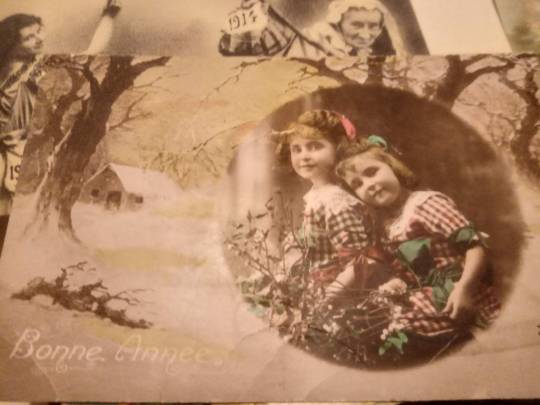
2 petites filles écrivent à leur père parti à la guerre de 14...
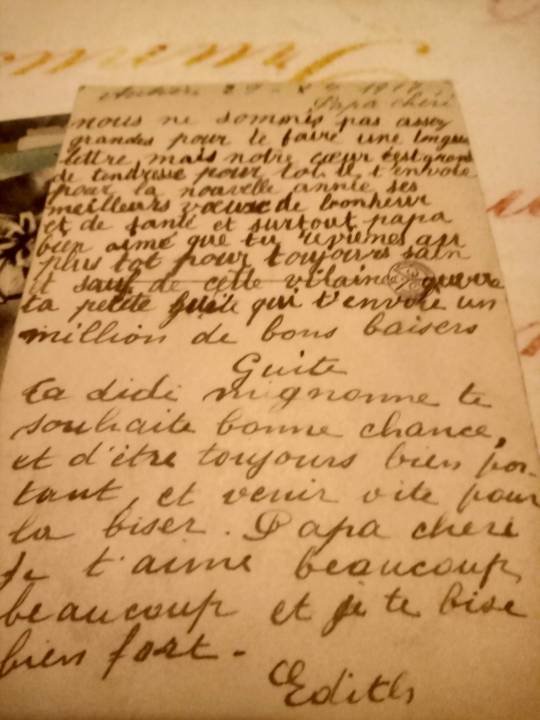
Le 27 Décembre 1917
Papa chéri
nous ne sommes pas assez grandes pour te faire une longue lettre, mais notre cœur est grand de tendresse pour toi, il t'envoie pour la nouvelle année ses meilleurs vœux de bonheur et de santé et surtout papa bien aimé que tu revienes au plus tot pour toujours sain et sauf de cette vilaine guerre ta petite fille qui t'envoie un million de bons baisers
Guite(?)
ta didi mignonne te souhaite bonne chance, et d'être toujours bien portant, et venir vite pour la biser. Papa chéri je t'aime beaucoup beaucoup et je te bise bien fort.
Edith

Un "poilu" écrit à sa chère et tendre en 1916 depuis sa tranchée...


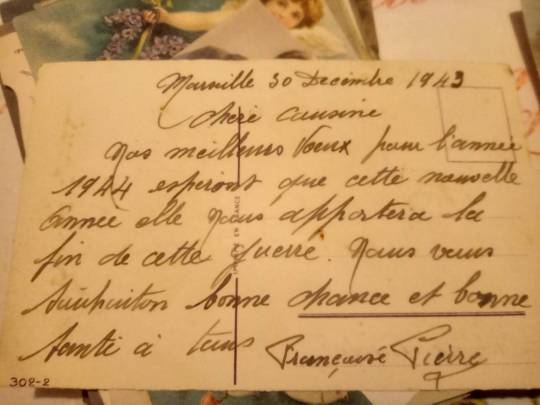
Françoise et Pierre écrivent une carte de vœux pour l'année 1944 à leur cousine...
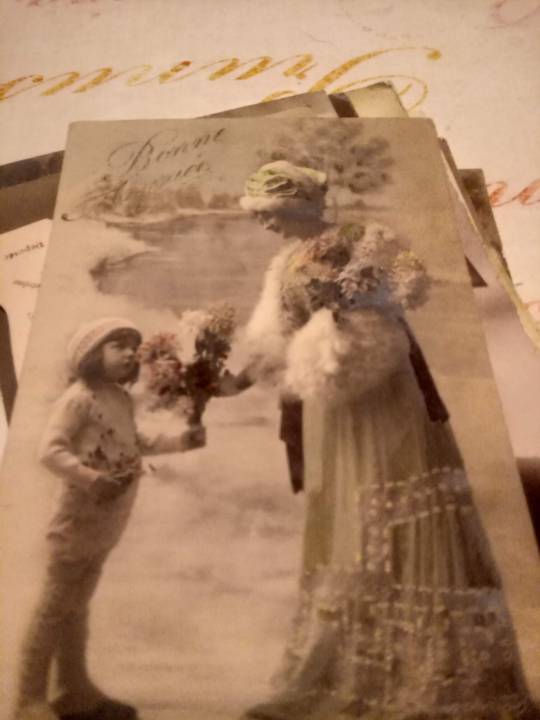
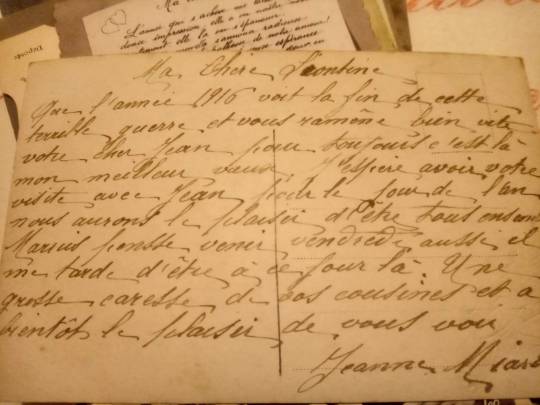
Jeanne-(?) écrit à sa chère Léontine une carte de vœux pour l'année 1916...
CARTES DE VŒUX...
Une question qui me vient, à la lecture de toutes ces cartes de vœux, qui ont pour certaines d'entre-elles plus de cent ans :
_QU'ATTENDEZ VOUS, LES HOMMES, POUR REFUSER DE PARTICIPER DORÉNAVANT A LA MOINDRE GUERRE ?
10 notes
·
View notes
Note
what do we know about anais deshorties and robespierre?
Very little I would say. We know Anaïs was the daughter of Robert-François Deshorties, merchant and royal notary in Arras, and his wife Marie Jeanne Joseph Lenglet (1726-1770). On January 7 1776, six years after his wife’s death, Deshorties got remarried to Robespierre’s paternal aunt Eulalie de Robespierre, making Anaïs and Maximilien step-cousins. The only really serious source we have for the two being a thing is Charlotte Robespierre’s memoirs (1834):
My brother’s amiability with women captivated their affection. Some of them, I believe, felt more than an ordinary sentiment for him. One among others, Mademoiselle Deshorties, loved him, and was loved in return. The father of this young person had taken for his second wife one of our aunts; from his first marriage he had two sons and three daughters. When my brother was elected deputy to the Estates-General, he had courted Mademoiselle Deshorties for two or three years. Many times already the question of marriage had come up, and very probably Maximilien would have married her, if the suffrage of his fellow citizens had not removed him from the sweetness of private life and thrown him into a career in politics. Mademoiselle Deshorties, who had sworn to him that she would ever belong only to him, took no account of this oath, and, during the session of the Constituent Assembly, gave her hand to another. My brother learned of this betrayal only upon his return to Arras, after the closing of the Assembly; he was very grievously affected.
In his Robespierre and the women he loved (1913), Hector Fleischmann also writes the following about it, though I don’t know how much of it should really be trusted:
One of Maximilien’s aunts, Marie-Eleonore-Eulalie, who, as we have seen, signed as godmother the baptismal certificate of Augustin Robespierre, married a widower, Robert Deshorties, notary of Arras. Besides a certain fortune, the notary brought his young second wife the charge of a little girl named Anaïs, of two other girls, and of a son. Anaïs, it appears, was specially loved by her stepmother, and as she grew up ”was dowered with all the grace and seductive attractions of youth." Maximilien was a frequent visitor at Mme. Deshorties', and it was not long before the inevitable idyll with Anaïs came about. According to Charlotte, he loved and was loved by her, but according to the police reportunearthed by M. Peuchet, Anaïs was a precious little jade. In speaking of the madrigals sent by Robespierre to the young girl, the informer adds: ”But the sly little Franc-comtoise puss received them on all sides." What does this mean ? Well, the end of the report tells us: "The pomp displayed by her parents in order to entice to their house the deputies of the States-General, had, I imagine, something to do with the hopes she now and again gave to this timid and jealous gallant [Robespierre]. He fell into the trap, and introduced into this family, who were playing with him, gallants more cunning than himself, who carried on an active campaign of glances, with whom there was an exchange of love-letters. The little lady was in the seventh heaven. He affected a reserve with this beautiful child, in order, perhaps, that the other guests might imitate him; but he must have begun to see his silly mistake. Several balls were given, but I never saw him dancing. The lovers managed to surround Robespierre by skilful colleagues, who won his heart by flattery. Between love and vanity, he resembled Buridan's donkey." Dare we say it? This police report appears to us very suspect. It is difficult to see what interest the royalist police could have in 1789 or 1790 in spying upon Robespierre and the Deshorties' drawing-room. But since all means of checking it is impossible, one can but quote the passage with all necessary caution. There is one thing which seems to confirm it — that is, that Robespierre did not marry Mlle Anaïs Deshorties. This does not mean that the question of marriage was not discussed. Charlotte says that it was spoken of various times, but that it did not take place, because Maximilien was torn "from the sweetness of private life” by his election to the States-General. Anaïs had, of course, sworn eternal love and fidelity to the young barrister, which no doubt is the reason why she hastened to marry, during the session of the Constituante, one of Robespierre's friends, the barrister Leduc. The young man, his sister tells us, was greatly pained at the news; but M. Hamel formally contradicts this evidence, and declares no promise of marriage was ever given. He declares that this information is taken from a source as authentic as that of Charlotte's, but until some conclusive evidence is published the question must remain in abeyance.
Sidenote, but I don’t really know where the idea that Anaïs was called just Anaïs comes from (as seen above, Charlotte gives no firstname for her). If we check the family grave [1] of the Leduc (Leducq) guy Fleischmann says she married, we find one Léandre Leducq (1768-1813) who married a Marie-Catherine Deshorties (1767-1847), as well as a Pierre-Louis-Augustin Leducq who married a Marie-Louise-Constance Deshorties (I suppose these four were a pair of brothers and sisters). The son of Marie-Catherine (born 1796) and the daugther of Marie-Louise (born 1798) then got married in their turn... @robespapier you said here that it’s Marie-Catherine who is Anaïs, so perhaps you know more?
[1]https://commons.m.wikimedia.org/wiki/File:Sépulture_de_la_famille_LEDUCQ_d’Arras_–_Cimetière_Montmartre_01.jpg
20 notes
·
View notes
Text
Wordlessly
Book: The Royal Romance
Pairing: None. Kiara & OC (Céleste, her cousin).
Rating: G
Summary: There is a lot on little Kiara's mind as she goes biking with her cousin Céleste. Can Céleste help her?
Word Count: 3, 191 words
Tagging @kiaratheronappreciationweek for Day 4: Family, @choicesficwriterscreations for FotW, and @choicesmonthlychallenge for the prompt Warm Hugs
A/N: This fic takes place two months after Queen Eleanor's death. Joëlle and Kiara (7 years old) are in Orleans, Loire with Joëlle's sister Jeanette. Jeanette has an older daughter, Céleste (9) and twins Céline and Cédric (6). Kiara is closer to Céleste, Ezekiel is closer to Céline, and Cédric is actually quite close to both siblings and to their cousins in Morocco (Hakim's side of the family). This fic also has a lot of connections to Ch 3 of Eleanor's Kitchen, which shows Joëlle and Queen Eleanor as best friends.

It will be a fine summer morning at the main square of Place du Martroi, Kiara's cousin promises her. Just the perfect time, and weather, to gear up for an hour-long bike ride. Maman can spend some time alone with Tatie Jeanette, and seek some of her much-needed solace at the cathedral nearby. And they can spend fifteen minutes cycling around Kiara's favourite thing to see in Orléans: the Jeanne d'Arc statue.
The Maid of Orléans sits mounted on her horse, sword in hand, proud and determined. Her bronze frame, stained a rusty blue-green from centuries of heat and dust and oxidisation, is cast into an alluring interplay of light and shadow against the morning sun. Joan of Arc, a heroine of France, the woman her aunt Jeanette was named in honor of. Kiara remembers a similar statue - of Captain Guard Val Greaves - at the Capitol square...not too far from the royal palace...
...Kiara instantly loses her smile. Then she shakes her head and tries to concentrate on something else.
"Cette statue gravement endommagée au cours de la duexieme guerre mondiale a eté restaurée en 1950 grâce a la générosité des habitants de la Nouvelle Orléans." She reads the plaque at the foot of the statue slowly, mentally substituting some of the all-too-familiar words into another language, as she always does. It's not easy - some of them are too big for her...like "inhabitants" and "generosity"...but she thinks she can understand the essence of it.
There was a Second World War, the war ruined the statue, and people from New Orleans helped make it look better than before. She knows already - from a map of the United States of America in her father's study desk - that New Orleans is a city there, near the Mississippi river. Baba told her lots of people speak French there too, but a different kind of French.
She tries to remember the bigger words she read on the plaque, but already they're slipping from her memory. Zeke would laugh and call this an exercise in futility, if he were here instead of at Orphys with Baba, Céline, Cédric and Tonton Henri - after all, weren't you raised on both French and English, Kiki? Haven't you been doing this your whole life? It can't be that challenging for you anymore.
But Kiara no longer deals with languages for just the challenge. Now she does it for the sheer joy of playing around with words that mean similar things in different places.
Céleste brushes away a stray leaf that has landed on her head, covering one of her tightly-coiled, intricately-braided cornrows. For perhaps the fiftieth time, Kiara admires the back of her cousin's head, where the braids form the shape of a heart near the nape of her neck. Silently she makes a promise to ask Maman to try it out once on her. When Maman feels more herself again.
Kiara traces a nervous finger over her own braids. They're perfect now - tiny coiled cornrows on her scalp, thicker braids raised high by hairbands that looked like a cluster of grapes, a side parting that took Kiara time to get used to but that she cannot help but admire now. But oh, how much Maman must have suffered today to get it right.
One slip of her hand. Then two. A braid hanging looser than usual, a thin cornrow looking slightly thicker and uneven, a stray curly strand winding out of an arrangement so meticulously planned and designed. It was so unlike Maman, who could do more intricate styles than this blindfolded and with her arms behind her back. The unfamiliar, puzzled frown between Maman's eyes was now threatening to become permanent.
By the sixth mistake she let out a rough growl, fisted her hands and paced agitated to the other end of the room, leaving an entire section of Kiara's hair half-done. When Kiara turned to look, Maman's back was facing her but her shoulders were shaking.
Tatie Jeanette, who had just completed her final touches on Céleste's cornrows, moved over to Maman, placing a hand on her shoulder. "Take a few minutes off, Joli," she said gently, "Renée has made some chamomile-spiced apple tea. That's your favourite now, right? It's in the kitchen. Still hot. It should calm your nerves. Go."
Kiara froze, wondering if her aunt had made a mistake by mentioning the tea was apple-flavoured. The last time Maman had such a drink was the last time she was with...with...
She winced. A very vague image of the late Queen as Kiara remembered her - raven-haired, gentle, smiling, a faint rose smell emanating from her wherever she went - floated at the fringes of her memory. She was grateful she didn't have a memory of what that face looked like in death. It was already painful, watching her funeral procession from a distance that day, Princes Leo and Liam walking behind her coffin, heads bent, steps measured. The older prince's jaw was tight and his eyes reddened and blazing...but the image that would forever stay with her, was the blankness on the face of the boy she often called her playmate. Every time she thought about his dark, unfocused gaze, an odd chill slithered through her spine.
If this was how she felt about that funeral, she can't imagine just how painful it must have been for Maman. Biding her goodbyes at the coffin, her voice at the Mass trembling midway through the late Queen's favourite hymn. After the adults from the Great Houses poured earth from their hands towards the lowered coffin at burial, Baba tightened his hands around Maman's shoulder, her sobs muffled in his jacket.
"It's going to take a while for Maman to go back to being Maman again," he'd whispered in Kiara's hair just before their flight to France, "But she'll get there. I promise you."
She'd felt less nervous when Baba said that. It was now two weeks since that flight, but on more days than not, Kiara didn't feel so sure.
When Maman took longer than usual to return, it was Céleste who saw the look on her face and convinced her to check on her in the kitchen.
"But what do I say?" Kiara whispered worriedly. These days everything she'd tried to say to comfort her seemed to have the opposite effect. Oh, Maman was very lovely about it, running an affectionate hand through her hair and smiling down at her, but the smile never seemed to reach her eyes like it always did.
Céleste shrugged. "Who said you had to say anything?"
Easy for Céleste to say. Everybody always said her oldest cousin gave the best hugs in the family. Soft, light ones for the kids younger than them, tentative ones for adults she didn't know, the tightest ones reserved for her parents. Kiara on the other hand always felt her body too awkward for good hugs. All knees and elbows poking at softer flesh. She felt uncomfortable giving them, and the leaving of an embrace always felt so odd on both sides. It was why she was so fond of talking her way through comforting people.
Only, this was a time where that kind of comfort didn't seem to change anything.
Thankfully, Maman's shoulders were no longer shaking when Kiara's feet padded their way to the kitchen. Her arms were gripping the counter, shoulders slumped, tired. The teacup was still full, all the steam in it long gone.
Kiara gulped. "It's okay, Maman," she said softly, "we don't have to go out today. It's always nice to have one whole day to just rest and do nothing, no, Maman?"
Again that look. Again that soft hand on her head. Again that smile that didn't reach Maman's eyes.
Kiara had struggled through 5 languages so far in her young life. Each time she failed to get things right, her chest felt tight and her shoulders heavy. But all that suddenly felt like nothing to the failure she experienced now.
Maman did Kiara's braids. Perfectly, meticulously, not a single strand out of place. But Kiara felt none of the victory they always experienced when Maman nailed a hairdo. In place of the joy and anticipation they both always had while braiding her hair, was a steely determination, a mechanical sequence of movement. As if Maman was thinking of something else and wanted not to, really badly.
"T'es prête?" Céleste says, her foot on the pedal of her cycle, waiting for her cousin to join her on their hour-long ride to Parc Floral de la Source. It's not where Céleste would have liked to take her, but it's still a beautiful place and she's sure her cousin would love the butterflies there.
"Yeah," Kiara says softly, "I'm ready." She runs back to her own cycle, bought two years ago the moment she'd seen Céleste on a bicycle, so connected to the act of riding it that the vehicle almost seemed like an extension of her. This beauty, bought by her aunt, is black and silver and deceptively fragile-looking, but very sturdy. Just like herself, Kiara would like to believe.
--
The sun is kind to them today. Its light streams silently through the trees and glistens over the Loire river, so it turns molten gold from the limpid blue of the early morning. The Loire à Vèlo path is a sandy white expanse of road, empty except for the few cyclists dotting the horizon.
Kiara presses her feet to the pedals as hard as she can, the light breeze turning into a sharp burst of wind when she picks up speed. The spaces in her scalp feel the cool kiss of fresh air as she struggles to catch up with Céleste.
She envies her older cousin for her speed and ability on a bike, but not too much. They all have their passions, after all. Céleste never had the knack for languages that Kiara did, or the love for animals that Zeke did, or even the raw artistry that her baby sister Céline was already beginning to show at age 6 - but by God did she work her magic if you gave her a bicycle!
It was the first birthday present she'd ever asked her parents for, and there was never a day you'd see her without it. Already the family was in awe of how she managed to cycle the entire Loire à Vèlo route last year, at the tender age of 8.
Already she had her answer ready for every school exam paper that had the question: "Qu'est-ce que tu veux faire quand tu seras grande ?". When I grow older, I will be tête de la course at Le Tour de France.
Tête de la course. The head of the race.
It's never going to be a matter of can, or maybe, or even should. Not for Céleste. It's a matter she has already had settled in her head. She will never imagine her future another way.
Kiara presses down on the pedals, even harder, enjoying this little race with her cousin. Even if it's one she's sure to lose.
--
Royal blue. Butter yellow. Purple at the center with orange fringes. The butterfly enclosure at Parc Floral de la Source has papillons in colours Kiara can't even begin to imagine.
Yet somehow, it is the black-veined, white-speckled, flame orange Monarch butterfly that most fascinates her. Kiara is almost tempted to touch its wings, to see if she'd find her fingers stained in fiery-hued dust as she'd always dreamed would happen. But she won't. She doesn't want to scare the poor thing away.
Lots of butterflies come to our garden. Come sometime in the morning, you'll see loads.
Kiara jerks her hand away as if stung. She isn't sure why these words, in the gentle tones of the young prince who used play tag and soccer with her, would give her a feeling of unease, rather than the usual mild fondness. Maybe because it has been almost a year since she last visited the palace gardens; perhaps because - if her parents' urgent whispers in the study were anything to go by - it is doubtful she would ever get to visit it again.
The last she saw of it, Her Majesty's (Call me Tatie Eleanor! she would hiss if Kiara ever tried to be formal around her) plans to create a hedge maze in the gardens had just begun to take form. There was very little to show of it back then, and Maman had whispered to her when they drove home that it would be roughly five to seven years before the maze looked anything like "Ellie's plans".
"Will it be fun?" she'd asked Maman when they'd reached half of the way back to Castelserraillan.
"Oh, very!" Maman said, a big grin on her face. "Ask your auntie Eleanor next time if you don't believe me. She used to spend all her time playing in garden mazes when she was a child."
Kiara frowned a little, suddenly remembering something.
"I thought Tatie Eleanor got the idea from that visit to Château de Villandry we took with her, two years ago!"
"That too!" Maman responded, grinning. "She loved visiting that place so much because it reminded her of her childhood." Her smile was now sweet, and a tiny bit conspirational. "We gave her that, ma fée."
Shivering, Kiara follows Céleste's lead outside to the open space that holds the spicy, woody, slightly-vanilla scent of purple irises.
Their housekeeper Renée packed them an enormous, sumptuous lunch before they left home; the cycling and the walking have made Céleste and Kiara ravenous enough to devour almost every spare morsel. Except, of course, one solitary baguette, which Céleste insists they keep so they can feed the flamingoes.
The birds make noises that sound like a cross between a loud honk and a piercing screech, scrambling to lay their claim on the pieces Céleste tosses their way. Kiara laughs, her fingers absently sweeping over the calm waters of the little Loiret tributary.
"I really wanted us to go to Château de Villandry today," Céleste's tone is that of a slight whine. "You always loved running through the garden labyrinth there."
Absently, Kiara pouts and throws another piece of the baguette to the birds.
"It's okay if we don't," her voice is almost a whisper, so soft Céleste has to strain to hear it. "This place was quite lovely!" If there is a false brightness she notices in her cousin's tone, Céleste doesn't allow herself to dwell on it.
They sit like that for a while - exactly how long Kiara can't recall - but when they're about to leave she calls out to her cousin. "Where would Maman and Tatie Jeanette be now?"
"Waiting for us at the canal," Céleste murmurs. She stops as she notices Kiara tense. "Don't look so scared, Kiki. Tatie Joli won't be sad forever."
Almost immediately, Céleste bites her tongue in a tacit apology. She's never been one to be very good with her words, and oftentimes - like this one - they come out sounding all wrong.
"Oh well," Kiara says, sighing, "It's not like anything I say will help. The more I talk, the sadder she gets. Maybe I should just..."
"Just what?"
"I don't know. Stop talking?"
The two girls are silent as they make their way back to where they'd kept their bicycles. It's only when they're about to mount that Kiara thinks to ask her.
"Céleste..."
"Hmm?"
"How do you know what kind of hugs your Maman wants?"
Céleste gives her a funny little look, like she's about to say I thought you'd never ask. But she shrugs instead.
"I don't always know, really. Sometimes I just try it and see if it works. Sometimes Maman doesn't want to listen to anything... sometimes she just wants someone to hold her tight. She lets me know."
"And if she doesn't like it?"
Céleste smiles. "I try something else. At some point I'll find something she likes!"
That's what I do with Maman too. Kiara thinks. But with words. Never with touch.
Kiara doesn't say a word after that. Not when they mount on their cycles, not when they exit the park, not when they reunite with their mothers at the canal, not even when they're back at the foot of the Jeanne d'Arc statue. Maman and Tatie Jeanette take turns to stare oddly at how unnaturally silent she seems, but Céleste's hand lightly touching her elbow reassures her. Lets her know that she doesn't need to talk until she feels like it.
Before they head to Tatie Jeanette's house, Céleste turns to her mother. "What about Château de Villandry next weekend, Maman? Kiki always liked the maze gar-"
She stops abruptly, noting with regret Kiara's panicked gaze and the terrified shake of her head.
Her voice is lower, more incoherent than a mumble. Her hands are folded in front of her, the perfect picture of a contrite child. "... we'll find another Château to visit, Maman. Sorry."
Too late. Maman holds it together, somehow, for a few minutes, before she excuses herself to her sister's study.
"I'll make you both a mug each of chocolat chaud... you'll like that!" Tatie Jeanette's voice seems falsely bright.
It is now Céleste who says nothing, as she gives Kiki one last, tight hug before she retreats to her room. Strangely, that action calms her a little.
Maman isn't at the desk of Tatie Jeanette's study, or even seated on one of the sofas or chairs. She is a crumpled figure on the floor, her body enfolding into itself, trying to look as invisible as possible even if she knows there is no one else in the room.
Kiara almost opens her mouth to speak, then snaps it shut. She stares at the lonely, defeated figure of her mother, remembering every scrape of knee that she had patted and every tiny arm-bruise she had given a little kiss to. Wordlessly.
Wordlessly, Kiara bends to her mother's eye-level. Lightly, tentatively, she wraps her arms around Maman's shoulder, keeping a small distance between their bodies.
After what feels like an age but must have been only two minutes, she feels something shift. Her mother angles her body more towards the circle of Kiara's arms, allowing them to tighten. Slowly, ever so slowly, Maman's hands make their way to the center of her spine, burrowing her daughter closer into her space. Against her cheek, Maman's own feels a little wet. But her body is more relaxed, the stress lines on her face receding.
Before this, Kiara had juggled with many possibilities to show comfort. Bringing up Queen Eleanor's name, never mentioning Queen Eleanor's name. Trying to talk more about this tragedy, trying to talk about literally everything else. Nothing had worked so far before this. Who knew that silence and touch could accomplish in 20 seconds what all the hours of talking couldn't?
Maman's hand rubs rhythmically along Kiara's back. Whether it's to return the gesture of comfort, or as an apology for not being the kind of mother she wanted to be for Kiara these days...Kiara has no idea.
What she does know, is that she hopes they get more chances. To share silence. To share comfort. To share - mother and daughter - the blanket-heavy warmth of these wordless embraces.
--
NOTES:
Two bits of foreshadowing here:
1. New Orleans: this was a bit of foreshadowing I included, because my TRR MC Esther hails from New Orleans.
2. The Monarch butterfly is the sigil of Krysanthe, the duchy that eventually Hana becomes the Duchess of.
Translations and additional notes:
1. Tonton - Like Tatie for aunt, Tonton is a nickname used to address your uncle.
2. Huge thanks to @thecapturedafrique for her suggestion of the girls wearing cornrows in summer! She'd also recommended styles, two of which I'd zeroed in on for Céleste and Kiara. The first one is Céleste's, the second Kiara's:


3. T'es prête? - Are you ready? (when said to a girl/woman)
4. "Qu'est-ce que tu veux faire quand tu seras grande ?" - What do you want to be when you grow up?
5. Tête de la course - Head of the race.
6. Papillon - Butterfly
Places mentioned in France:
The fic is largely set in Orléans, a city that's situated close to the Loire River.
Place du Martroi: The Martroi square is the main square of the city of Orleans, where stands the equestrian statue of Joan of Arc carried out in 1855 by Denis Foyatier.
Loire à Vèlo: La Loire à Vélo is a unique, 800km cycle route. It forms the western section of the EuroVelo 6 route (linking Black Sea to Atlantic) (basically you get a great view of the river through this cycling route).
Parc Floral de la Source: a French garden situated to the south of the River Loire, in the La Source neighbourhood of the town of Orléans, in the département of Loiret. The source of the Loiret tributary can be found at the center of this park.
Château de Villandry: The Château de Villandry is a grand country house located in Villandry, in the département of Indre-et-Loire, France. It is especially known for its beautiful gardens and has an intricate labyrinth/maze garden arrangement too.
Orphys: This is a country in the Cordonia universe which is home to the princesses Lerato and Lesidi.
#kiara theron#kiaratheronappreciationweek#KTAW#the royal romance#the royal heir#the royal finale#KTAW Day 4: Family#lizzybeth1986#content: fanfic
35 notes
·
View notes
Text
"Jeanne (de Penthièvre) presented a new point which d’Argentré deemed ‘tresnotable’: that the nature of Brittany did not allow it to be confiscated, since it had never been part of France in the first place. This was based on the nature of previous homages from the duke to the king, and maintained a fiction (which the later Montfortists were also to embrace) that no fealty was actually entailed. The conclusion drawn from this version of the Franco-Breton relationship was that the king could take no such action unilaterally, but needed the consent of the Breton lords and people. This claim was closely tied to an argument that had been advanced for the Penthièvre succession in 1341, whereby French control over Brittany was limited simply because of how the duchy had become a French fief: the duke had submitted his duchy to the king, not received it as a gift. The emphasis on the royal status of the duchy, however, was new, and aligned more closely with the Montfortist position of 1341.
... We do not know what response, if any, the king’s lawyers made to this argument, though it took more than a week of deliberation, until 18 December, for the pronouncement of the sentence of condemnation. Both Jeanne and Jean found themselves deprived of their rights, though it was not until April that the change was put into effect. But Charles V inadvertently found himself suddenly deprived of allies as the elites of Brittany put up a strong resistance to the king-as-duke’s attempted takeover of the duchy. On 25 April 1379 they created a league to ‘help one another for the guarding and defence of the ducal rights of Brittany, against all those who might want to take ownership and possession of the said duchy, except for the one to which it must belong in the true line’, a statement of intent which nicely left undefined who that might be. Among most of the major barons, Jeanne’s name was not listed, though she gave them her support and would be included first among the backers of Jean IV for negotiations in October 1379. Her participation in the events to come speaks to her continued clout among the Breton elite, but also to the complicated political tightrope which she had to walk: with her son-in-law as the royal representative in Brittany (and presumably still no love lost for Jean IV) it was prudent for her to keep her options open, and more importantly to formally avoid any compromising situations which might prejudice her in future.
However, drastic steps had already been taken … The league of barons had already sent envoys to England to seek out the exiled duke… As the situation intensified, it became increasingly urgent to change Jeanne’s mind. But better an heirless duke with whom she had a treaty, than a king who had rejected her right to be called duchess. Jean IV did not actually return to reclaim his duchy until August 1379, at which point Jeanne was apparently amenable to her cousin’s presence. The Chronicon Briocense had her at his reception at Dinan, where she set an example for the rest of the lords and, with Jean, received their praise. Whatever conviviality there may or may not have been, this committed Jeanne fully to relying on the eventual applicability of the ‘escape clause’ in the Treaty of Guérande. The duke’s return prompted a further bout of combat and tense negotiations, but Charles V died from illness in September 1380, and a few months into the reign of his successor (Charles VI, a minor under the tutelage of his uncles, including Louis d’Anjou) Jean IV signed the second Treaty of Guérande, which essentially renewed the terms of the first. Jeanne and her son Henri swore to uphold this agreement on 2 May 1381.
Unlike the first treaty, the second did not drive Jeanne to another self-imposed exile from Brittany. In fact, she took up residence in La Roche-Derrien and, as far as our records show, mostly stayed there for the next three years. Presumably during this time she was mostly concerned with the administration of her northern lands. This endeavour was sometimes undertaken in concert with the reinstated Jean IV: when he conceded certain rights to Charles de Dinan on 12 July 1381, Jeanne reissued the grant as her own reward for Charles’ services. Very few acta survive from before her death on 10 September 1384, however,which is an unfortunate loss for the sake of comparison to the period 1365–75. She was buried, as planned, next to Charles at the Franciscan church of Guingamp, as was fitting for ‘the most illustrious lady Jeanne, most outstanding mother and daughter of the order of the Friars Minor, duchess of Brittany, wife of Charles de Blois (of good memory)’
-Erika Graham-Goering, "Princely Power in Late Medieval France: Jeanne de Penthièvre and the War for Brittany"
#SLAY GIRL 🌟#historicwomendaily#jeanne de penthievre#14th century#breton history#war of breton succession#queue#my post
9 notes
·
View notes
Text
du coup hier sur le trajet, vers minuit mon ami platonique me dit qu'il vient juste de se réveiller (tout est normal) et m'engueule à moitié quand je lui dis où je vais avec entre autre ma cousine qui ne le supporte pas, en mode t'aurais du me dire blablabla je serais pas venu, il me soûlait trop. je ne pouvais pas savoir que la première chose qu'il ferait en se réveillant serait de sortir avec tous ses potes au même endroit que moi. bref je suis un peu en stress mais ça a le mérite de nous réveiller avec mon amie et surtout ça la fait rire. on arrive et je rencontre des cousins inconnus au bataillon de ma cousine sortis de je ne sais où (enfin si, de suisse) je vois aussi directement tous les potes de mon ami platonique qui veulent me parler mais qui peuvent pas trop, son meilleur ami me dit ouin je croyais que tu m'avais pas reconnu mais j'étais juste en panique. enfin bon c'est très cool on s'amuse bien, je vais voir l'ami platonique quand ma cousine regarde ailleurs (d'ailleurs j'adore ses cousins), on se fait des sourires et on rigole de loin. puis à un moment je parle à un gars, pour une fois qu'ils me soûlent pas ici, franchement sympa je l'aime bien on danse un peu quand passe baccara parce qu'il adore comme moi... après un looong moment je vois que l'ami platonique nous regarde en mode un peu vener mais bon on parlait juste sauf que d'un coup il m'embrasse et vraiment à ce moment je me dit: merde, encore une fois et je me dis: re merde, du coup j'essaie de me barrer diplomatiquement mais je me sens trop mal j'ai vu son regard et je sais que c'est la merde, il m'envoie "ça va tu t'amuses bien" suivi de "me parle plus" ou un truc comme ça et je m'amuse plus du tout après j'ai plus toute la chronologie mais je me souviens que son meilleur ami m'a dit qu'il était trop hypocrite que je faisais ce que je voulais et que je pouvais lui dire d'aller se faire foutre de sa part mais bon je l'ai pas fait je ne suis pas suicidaire. entre temps ma cousine et ses cousins qui nous ont payé des tournées de shots toutes les heures étaient partis donc la voie était libre on pouvait traîner comme on voulait avec tout le monde. on a discuté de mes bisous, il me regardait trop mal donc j'ai chouiné deux fois la première dans les toilettes avec lui qui toquait comme un malade pour que je sorte et la deuxième fois c'était devant lui je fixais un point sur le sol pour m'arrêter mais ça marchait pas trop donc il a fini par essuyer mes larmes en me disant de m'amuser et que ça allait. ensuite son ami le garçon de café a pris de la coke il voulait m'en filer j'ai dit non ou alors c'était peut-être avant car j'ai aussi un peu pleuré avec lui, il était trop mignon il voulait me rassurer sauf que déjà quand il parle français je comprends que la moitié de ce qu'il dit mais là c'était incompréhensible. ensuite comme les hommes ont des doubles standards l'ami platonique me dit que sa pote avec qui j'avais dansé me voulait donc ni une ni deux je suis tombée dans ses bras, j'embrassais l'une j'embrassais l'autre j'étais au max il me faisait plus du tout la gueule et on est restées collées très longtemps avec jeanne. j'ai fini par gueuler à un mec d'aller se faire foutre et de dégager parce qu'il passait son temps à nous mater à nous coller et à nous applaudir avec un sourire de gros con en plus il m'avait déjà grave touché alors que j'essayais d'aider une meuf à retrouver ses amis parce qu'elle était toute seule et vraiment trop bourrée (et défoncée, je suspecte le garçon de café pour ça) entre temps je danse avec le centaure, je tourne dans tous les sens (il ressemblait un peu à un triton aussi) puis c'est passé vite en fait: engueulade + sauvetage meuf + centaure + jeanne + danser avec le garçon de café aussi obligatoirement. quand c'était fini je vois un gars qui me fixe et en fait ça faisait mille ans qu'il me fixait déjà, je croyais que c'était celui que j'avais embrassé mais non, il me demande mon nom et il me dit "merveilleuse mathilde..." il m'a fait trop peur mais voilà belle conclusion je suis merveilleuse même quand je fais de la merde
#en vrai on en a reparlé ce matin il m'a dit qu'il avait pas à me bouder que je faisais ce que je voulais et tout#mais que ça l'avait blessé et qu'il était mal#on s'est dit qu'on s'aimait fort#et je me suis grave excusé encore une fois parce que c'est nul et que j'aurais pas aimé qu'il fasse la même chose#ps: jeanne a un tatouage avec un canard... trop mimi
7 notes
·
View notes
Text
Famous Five Art Nostalgia #12 – Part 1
Introductory post
Masterpost
🌊🎟️🐴 Five Go Down to the Sea – Le Club des Cinq au bord de la mer
Original publication date: 1953 (UK), 1959 (France)
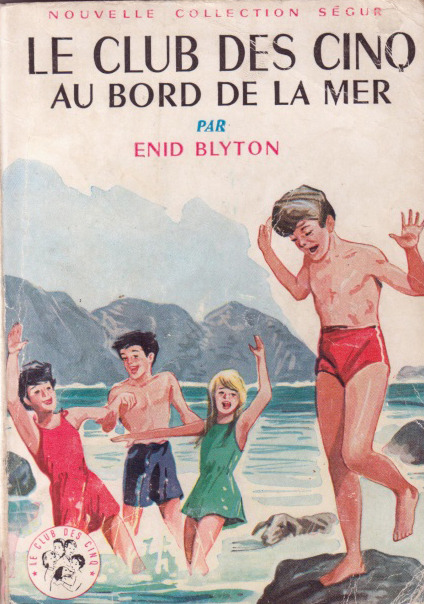
(Original cover by Aldo de Amicis, 1959)
Whereas most of the illustrations for the first edition of the FF series were divided between two artists (first Simone Baudouin, then Jeanne Hives), this book stands out for having a different illustrator: Aldo de Amicis. Sadly, this guy follows the trend initiated by Baudouin and also swaps Dick and Julian’s hair colour. Sigh.
~~~~~~
Plot summary (adapted from Wikipedia):
Siblings Julian, Dick and Anne, and their cousin Georgina 'George' and her dog, Timmy, spend a holiday at a coastal farm in Cornwall.
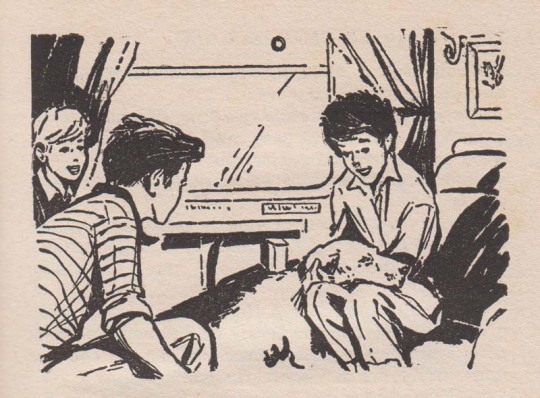
(On the train to Treamannon [Trémanoir])
There, they are nicely welcomed and hosted by the garrulous Mrs Penruthlan [Mme Penlan] and her enormous husband, whose monosyllabic utterances they find incomprehensible and quite funny. The children encounter a young boy named Yan (Jan) [Yan (Jean)], as well as a group of travelling entertainers called the Barnies [les Barnies].
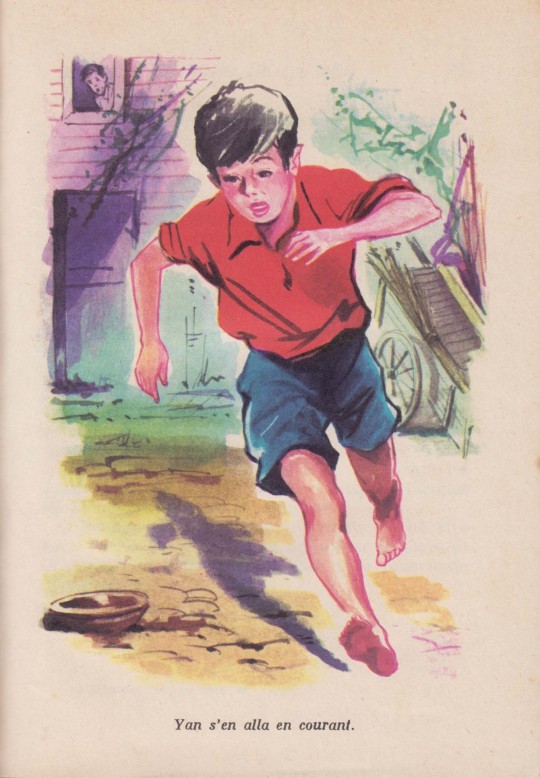
(Young Yan is exceedingly curious about the Five, but also very skittish)
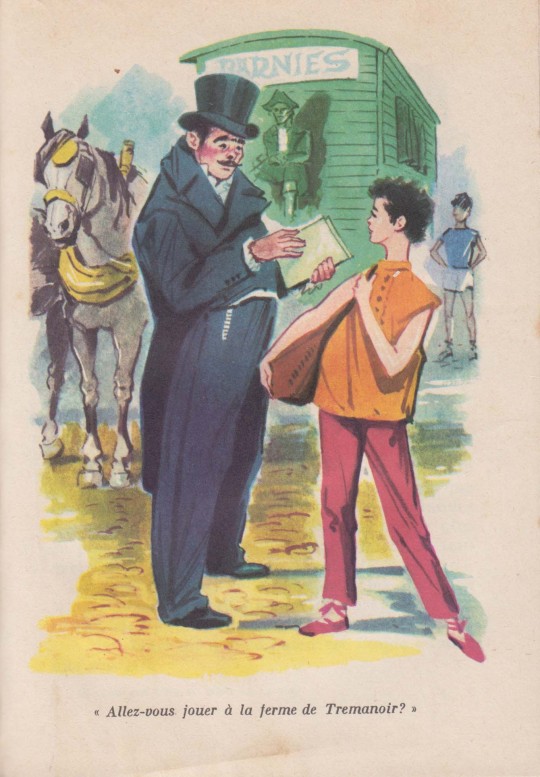
(George picks up a leaflet promoting the Barnies’ upcoming shown)
The children learn that long ago, villainous locals would shine a light on stormy nights to direct ships onto rocks to wreck them, and the vessels would be smashed and their cargoes washed ashore and stolen. Julian and Dick discover a light is again being shone at night, so the children set out to solve the mystery.

(Right after seeing the mysterious light being shone at night, the boys cannot wait to tell the girls their discovery)
The Five put their investigations on hold when the Barnies arrive at the farm, as they spend the day helping the Penruthlans clean up the barn and prepare the feast preceding the show. After the show, Dick and Julian get into a bit of mischief when they nab a horse costume and get stuck inside due to a malfunctioning zip.

(Clopper [Clopinant] the hilariously funny (pretend) horse is the highlight of any Barnie show)
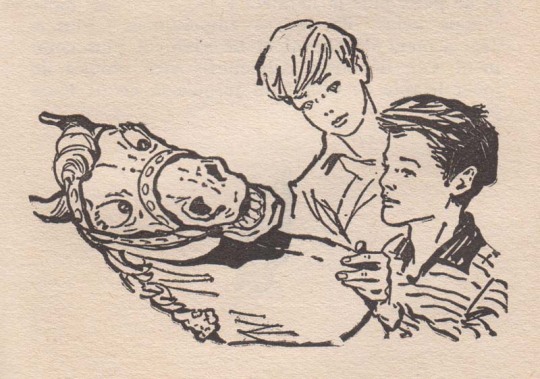
(Julian and Dick examine Clopper’s head up close)
Resuming their investigations, the Five visit the tower from which the light was shone, but they get locked up in a cellar and told by the smugglers that they had come at an 'awkward time.' Yan, who had secretly followed the Five, helps them escape through the Secret Way, a path used by the Wreckers of old. They go back to Mrs Penruthlan, in the misbelief that Mr Penruthlan is in league with the smugglers. When the Five and Yan discover that Mr Penruthlan is actually with the police and find out that his consistent "aahs", "ooohs" and "ocks" are because he didn't have his false teeth in, the Five quickly warm up to him.

(After following Yan through the Secret Way, the children realise that the passage ends up in a shed at the farm)
After joining forces with Mr Penruthlan, the Five discover that the 'Guv'nor' of the Barnies actually is the exchanger of the goods the smugglers stole from the wrecked ships. Mr Penruthlan discovers a white package containing smuggled drugs inside Clopper, and in the end, after calling the police, Mr Penruthlan guffaws and hands Clopper over to Julian and Dick, and wishes them luck with it.
Bonus:

(Now what I want to know, is *what* did Dick and Julian do with that horse costume after this book?!)
~~~~~~
Cover art through the ages:
(Disclaimer: This is not an exhaustive list; sometimes the dates are difficult to pinpoint; and I have purposefully not included editions that re-used similar cover art, with differences only in layout and font style.)
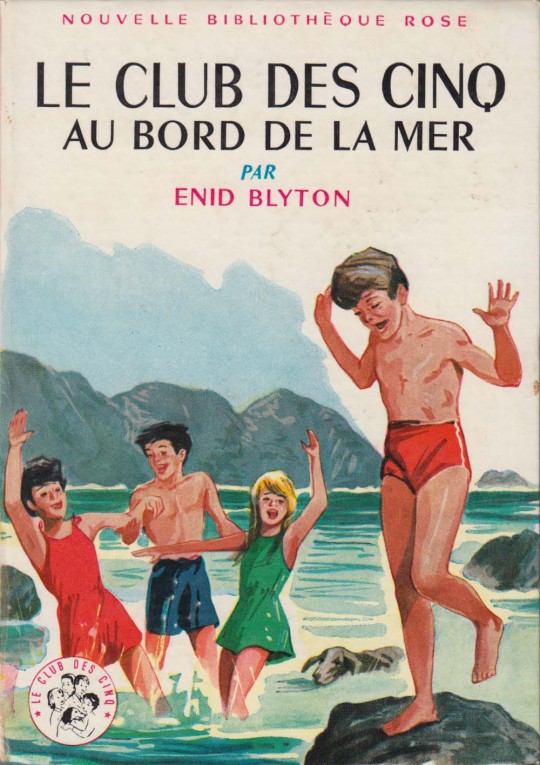
(Original cover art by Aldo de Amicis, Hachette, 1963 – dark-haired Julian has a nicely-developed chest 😏, while Dick seems uncharacteristically coy and wary of water 🤨)

(Famous Five and the Big, Huge, Ginormous Beach Ball (at least Timmy gets to enjoy the shade!) – Jeanne Hives, Hachette, 1966)
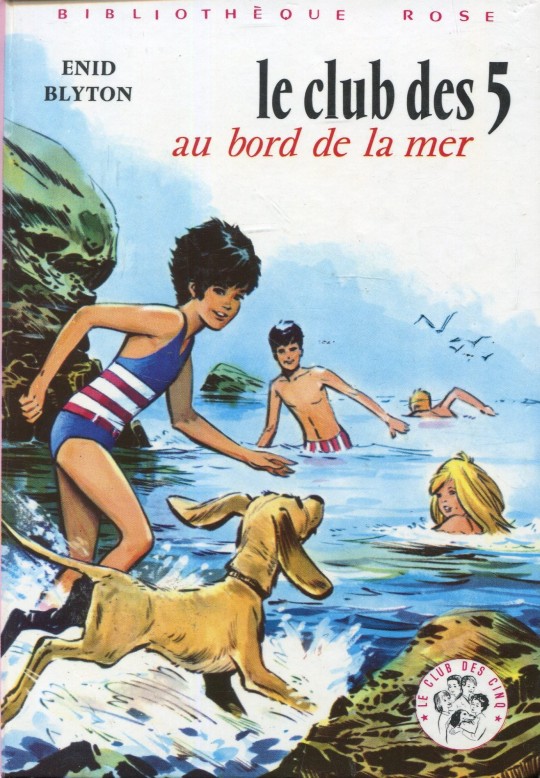
(Watery fun! Jean Sidobre, Hachette, 1972)
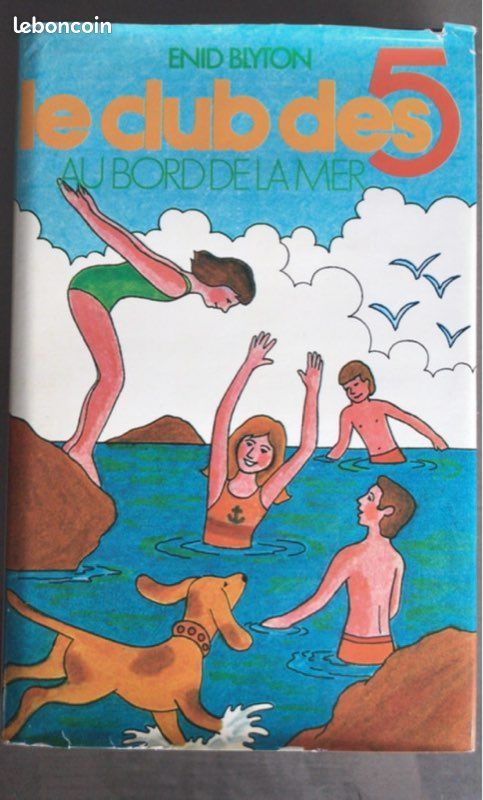
(More watery fun! J.P. Morvan, France Loisirs, 1977)

(Yet more watery fun, because why stop a good thing? Umberto Nonna, Edito Service, 1981)

(Anne and Dick seem awfully tanned back there – remember to put on sunscreen! Jean Sidobre, Hachette, 1984)

(A pretty scenic view courtesy of Paul Gillon, France Loisirs, 1996, based on earlier art from 1992)

(Trapped in the cellar! on top of the tower?? Wtf 😩 – Frédéric Rébéna, Hachette, 2007)
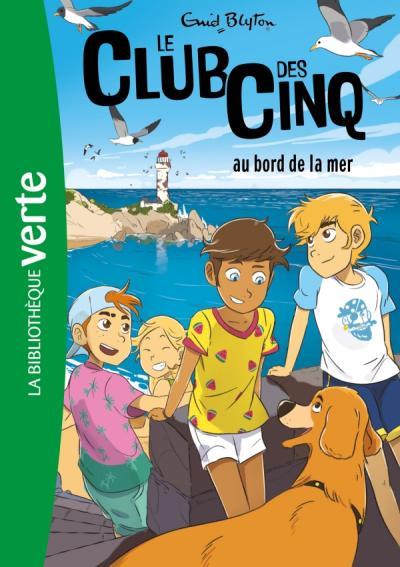
(Okay, I don’t love Auren’s art but I admit that this cover does make me want to go on a trip to the seaside 😎 – Hachette, 2019)
~~~~~~
That's all for today, thanks for reading!
#papillon82 reads#famous five art nostalgia#famous five#le club des cinq#illustrations#aldo de amicis#enid blyton
10 notes
·
View notes
Text
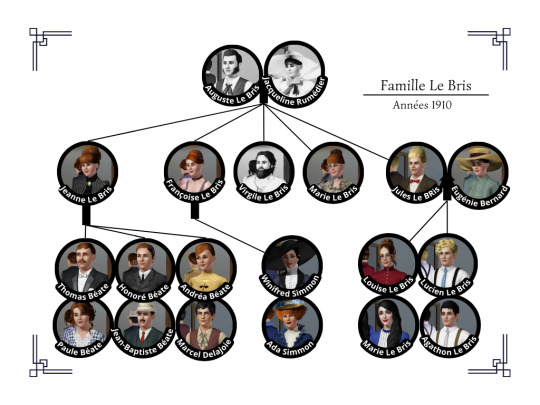

À compter de maintenant, je n'uploaderai plus d'arbres complets, car malheureusement ceux-ci sont bien trop lourds et c'est toujours un casse-tête pour trouver une plateforme où les héberger. Par contre, voici comment les héritiers français et canadiens sont apparentés :

Comme d'habitude, je poste également un récapitulatif des membres en vie de la famille de Jules (1873) :
Adèle Rumédier (1803) est sa grand-mère, c’est une vampire 🧛🏼♀️
Joseph Bernard (1834) est son oncle, il est aussi évêque de Kingston.
François (1858) et Alexandre Bernard (1859) sont ses cousins.
Jeanne Delajoie (1864), Françoise Simmon (1866) et Marie Le Bris (1872) sont ses sœurs. Jeanne est mariée à Thomas Delajoie (1851) et Françoise est mariée à Charlie Simmon (1865).
Thomas (1891), Honoré (1894), Andréa (1897), Paule (1899), Jean-Baptiste (1899), Marcel (1910), Winifred (1888) et Ada (1889) sont ses neveux et nièces.
Eugénie Le Bris (1873) est sa femme. Il a quatre enfants avec elle : Louise (1893), Lucien (1905), Marie (1908) et Agathon (1910).
Coral Vilaró (1874) est sa bonne.
6 notes
·
View notes
Text
Anne de Beaujeu
Anne de Beaujeu (Anne de France, 1461-1522)
Unofficial regent of France and duchess of Bourbon
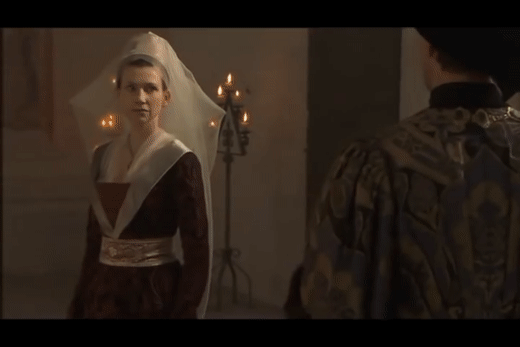
Anne de Beaujeu provides an example of female political authority in a country where the Salic Law prevented women from assuming the crown. She also illustrates the tension between an increasingly centralized monarchy on the one hand and feudal independence on the other, having supported both causes at different times in her life. Probably born in 1461, Anne de Beaujeu was the oldest of the surviving children of Louis XI, king of France, and the one said to resemble him most intellectually and temperamentally. When this king died in 1483 leaving a thirteen-year-old Charles VIII on the throne, Anne and her husband, Pierre de Beaujeu, as his guardians, assumed control. In so doing, they resisted Louis d'Orléans, the next in line to the throne, who wished to be named regent. Louis and his supporters sought help from the estates-general who met in 1484 but who ultimately supported Anne's cause. Referred to as Madame la Grande (Grand Madam), Anne was recognized by the court and by foreign emissaries as the person actually ruling France during the early years of Charles's reign.
In 1488 she and Charles VIII squelched a noble uprising, the Guerre Folle (the Foolish War) led by Louis d'Orléans and Francis II duke of Brittany. Charles then married the new duchess of Brittany, Anne, to ensure the duchy's loyalty to France. Meanwhile Pierre de Beaujeu's two older brothers had died, leaving Pierre with the Bourbon inheritance. Anne and her husband were now the richest and most powerful nobles in France. In 1491, after the loss of one infant and fifteen years of childlessness, Anne gave birth to a daughter, Suzanne. As Charles VIII grew increasingly independent of his older sister, Anne redirected her attention to her own lands and feudal duties, though she remained his advisor while retaining her ties to the court. When Charles died suddenly in 1498 leaving no heirs, Louis d'Orléans became king of France. Neither his previous attacks on the crown nor his well-known personal vices inspired confidence in his subjects, so the support of Anne de Beaujeu and her husband were instrumental in a smooth accession to the throne. Anne agreed to overlook their antagonistic past and did not hinder the annulment Louis immediately requested from her physically disabled sister, Jeanne. In exchange, Louis XII waived the royal rights to the Bourbon inheritance in the case that Anne and Pierre did not have a male heir. Once all this had been established, the Bourbon's relationship with Louis XII and his new queen, Charles's widow Anne de Bretagne, became quite cordial. Anne de Beaujeu no longer held any direct influence, however, over the governance of the French state.
In 1504 or 1505, after the death of her husband and before she arranged a marriage for her daughter, Anne wrote Suzanne a book of lessons, Les Enseignements d'Anne de France, duchesse de Bourbonnois et d'Auvergne, à sa fille Susanne de Bourbon, modeled on the book that Louis IX had written for his daughter, the one her own father had written for Charles, and the writings of Christine de Pizan. Anne's version contains conventional advice on the appropriate behavior for noblewomen. During her unofficial regency, Anne had overseen the education of many young noblewomen at court, including Louise de Savoie, Marguerite d'Autriche, and Diane de Poitiers. The humble feminine figure that emerges from the Enseignements, however, seems at odds with their independent author. More easily recognizable are the anxieties about life as an older widow distant from court. The Enseignements ends with a tale about a noblewoman who bravely sacrifices her only child for the honor of her family and the interests of the king. Suzanne was, in fact, married shortly thereafter to a cousin to protect the integrity of the Bourbon inheritance.
In contrast to the moral of her tale, however, the interests of a noble family and those of the crown did not always overlap. Before she died, Anne witnessed the opposition of two adults whom she had raised from childhood: her son-in-law, the connétable de Bourbon, and Louise de Savoie, mother of Francis I, successor to Louis XII. Louise and her son, suspicious of the wealth and power of the connétable, the Bourbon heir, challenged his inheritance. After losing the domain that Anne had so carefully built up and defended during her lifetime, the connétable, perhaps with Anne's bitter approval, responded by betraying the French king Francis I- the other cause that Anne had defended so staunchly during her brother's reign. Anne died in 1522, before this ultimate betrayal.
Emily Thompson in Encyclopedia of Women in the Renaissance.
#xv#xvi#anne de france#anne de beaujeu#regents#duchesse de bourbon#louis xi#charles viii#pierre de beaujeu#louis xii#françois ii de bretagne#anne de bretagne#la guerre folle#suzanne de bourbon#sainte jeanne de france#louise de savoie#marguerite d'autriche#diane de poitiers#charles iii de bourbon#le connétable de bourbon#françois i#proof that anne approved of this ? i didn't find anything#the connétable's betrayal is a complex story#one can point fingers at françois i and louise de savoie too#emily thompson#encyclopedia of women in the renaissance
17 notes
·
View notes
Text
La petite histoire de France


Grant Lawrens : Baptiste
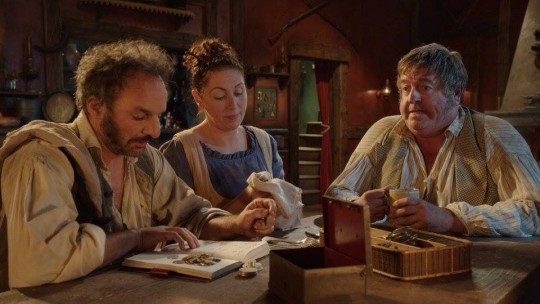
David Salles : Jean Plancher cousin par alliance de Napoléon, Karina Marimon Renata Plancher cousine de Napoléon et femme de Jean
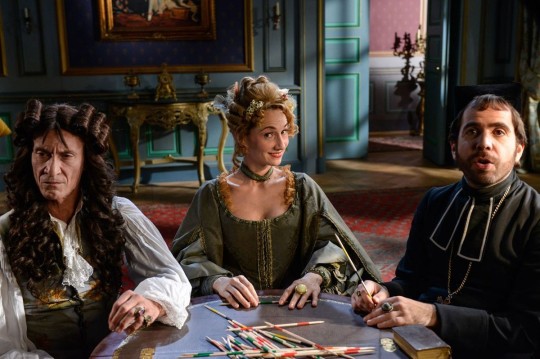

François Levantal : comte Philippe Honoré de Roche Saint-Pierre cousin de Louis XIV, Anne-Sophie Girard : comtesse Marie-Louise de Roche Saint-Pierre femme de Philippe, Philippe Beglia : Frémont majordome des Roche Saint-Pierre, Sébastien Castro : abbé Martin, Jean-Luc Couchard : Feuillade, Émissaire du Roi et ami des Roche Saint-Pierre qui leur apporte des nouvelles de Versailles, et leur fait toujours de fausses joies



Alban Ivanov : François d'Arc, cousin de Jeanne d'Arc, Ophélia Kolb : Ysabeau d'Arc épouse de François d'Arc, Fatsah Bouyahmed : Gaspard le gardien de brebis, Philippe Duquesne : Adelin beau-frère et ami de François d'Arc, mari de Guillemette père d'au moins 10 enfants
6 notes
·
View notes
Text
Un cousin DENAES, pensionnaire à l’hôtel des Invalides
Pierre Joseph DENAES est un petit-cousin de mon arrière-arrière-arrière-grand-père Jean François DENAES.

Il a vu le jour le 13 mai 1776 à Hazebrouck.

Son père Jacques DENAES était marchand. Beaucoup de ses frères et sœurs sont décédés en bas-âge. Du premier mariage de son père avec Rose ELIAS, en plus de Pierre Joseph, ont vécu jusqu’à l’âge adulte : Marie Angélique qui a épousé sur le tard, un veuf qui était tisserand à Zermezeele, Marie Françoise qui s’est mariée à un boucher de Cassel, Jacques WYON et Pierre Jean Baptiste qui était journalier à Hondeghem et qui a eu beaucoup d’enfants.
Pierre Joseph DENAES s’est probablement engagé dans l’armée vers l’âge de vingt ans. Il était fusilier dans la treizième demi-brigade. Il a vraisemblablement combattu en Italie puis en Egypte.
La vie de Pierre Joseph DENAES
A son retour de l’armée, Pierre Joseph DENAES qui avait perdu l’usage du bras droit a repris les activités de marchand de son père. Son père est mort le 29 mai 1802 et la deuxième épouse de son père, Marie Françoise PLOCKYN, le 4 novembre de la même année.
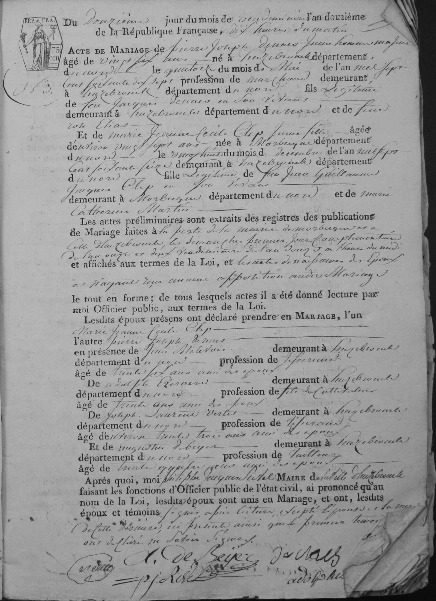
Pierre Joseph DENAES a épousé le 12 vendémiaire an XII (5 octobre 1803) une jeune-fille de son âge qu’il avait mis enceinte. Il connaissait bien Marie Jeanne Cécile CLEP car le père de celle-ci, Guillaume CLEP (1716-1800) avait épousé en premières noces Marie Joseph CLEP (1719-1765) dont la nièce était Marie Françoise PLOCKYN (1748-1802), la deuxième épouse de Jacques DENAES.

Caroline Sophie DENAES, la fille de Pierre Joseph et de Marie Cécile CLEP est née le 3 ventôse an XII (23 février 1804) à Hazebrouck. Il est à noter que son père était absent à sa naissance, sans doute pris par ses activités de marchand. Caroline n’a vécu que dix-neuf jours. Elle est décédée le 22 ventôse an XII (14 mars 1804) à Hazebrouck.
L’activité de marchand n’était sans doute pas assez florissante ou trop fatigante pour un homme handicapé ou encore l’épouse de Pierre Joseph DENAES aspirait-elle à ce que son mari ait une vie plus sédentaire comme l’un de leurs beaux-frères ? Toujours est-il qu’on retrouve Pierre Joseph DENAES, cabaretier à Morbecque, à la naissance de son fils Louis Alexandre Joseph, le 26 mars 1806.
Dans l’acte de mariage de ce fils, le 2 avril 1834, à Lille, celui-ci affirme qu’il réside à Lille, rue du Sec Arembault, depuis seize ans, soit depuis 1818. Des problèmes financiers ont sans doute conduit Pierre Joseph DENAES et sa famille à prendre le large à Lille.
Mais, dans une grande ville, la misère était encore plus rude, au XIX° siècle. Marie Cécile CLEP est décédée à l’âge de cinquante et un ans mais il est indiqué dans son acte de décès qu’elle en avait cinquante-cinq. Elle est morte le 29 août 1828, à l’hôpital Saint Sauveur de Lille. Ce sont deux infirmiers de l’hôpital qui ne savaient ni lire ni écrire qui ont déclaré son décès ! Le secrétaire de mairie a écrit le nom DENAES comme ça se prononçait, c’est-à-dire DENASSE et il a même déclaré que l’époux de Marie Cécile portait les prénoms d’Alexandre Joseph (ce sont ceux de son fils) au lieu de Pierre Joseph. Il y a fort à parier que son corps a été jeté dans la fosse commune.

Un an avant la mort de son épouse, le 1° juin 1827, Pierre Joseph DENAES qui ne devait pas être bien vaillant non plus, était admis à l’Hôtel des Invalides. Il avait alors cinquante et un ans. Le registre d’entrée, consulté au Service Historique de la Défense, à Vincennes, nous indique que Pierre Joseph DENAES a été pensionné à partir du 6 février 1830 mais le montant de la pension n’est pas indiqué. Il est également fait mention d’une réadmission à l’hôtel des Invalides, le 22 août 1832. On peut donc penser que Pierre Joseph DENAES est retourné vivre à Lille pendant quelques temps ou qu’il s’est trouvé un petit logement à louer à Paris.
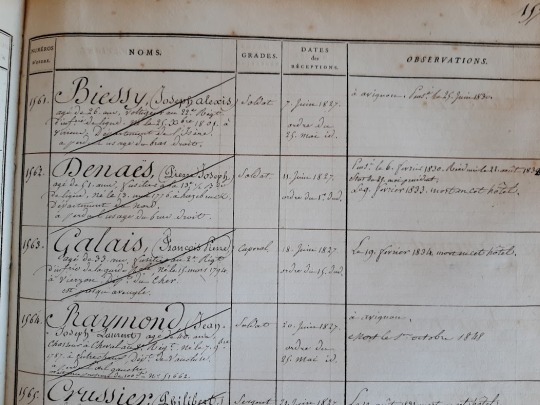
source: SHD/GR/2XY272
Pierre Joseph DENAES est décédé le 9 février 1833 à l’hôtel des Invalides. Il avait cinquante-sept ans. Il a été inhumé le 12 février suivant, au cimetière du Montparnasse, dans la fosse commune.

information donnée par Filae
A cette époque, de très nombreux soldats étaient admis à entrer à l’hôtel des Invalides. J’ai dénombré deux cent soixante-six entrées pour l’année 1827. La moyenne d’âge des entrants était d’un peu plus de cinquante ans, certains n’avaient qu’une vingtaine d’années et d’autres plus de soixante-dix ans.
La descendance de Pierre Joseph DENAES
Le fils de Pierre Joseph DENAES, Louis Alexandre Joseph qui était fileur de coton a donc épousé, en 1834, Florimonde Sophie Joseph BERNARD, couturière et de six ans sa cadette. Ce jeune-homme qui avait perdu ses deux parents allait donc se créer une nouvelle famille.
Ils ont eu un fils, Louis Romain DENAES, né le 23 mars 1836 à Lille mais la vie de ce pauvre enfant fut brève. Il est décédé à Lille, le 22 juin 1838.
J’ai remarqué que Louis Alexandre Joseph DENAES changeait souvent d’adresse. En 1828, il demeurait avec sa mère, 27 rue du Priez, en 1834, son adresse était rue du Sec Arembault, en 1836, il partageait avec sa femme un domicile au 23 rue Saint Nicaise et en 1838, ils étaient au 18 rue du Priez. Il est probable que lorsqu’ils ne pouvaient plus payer le loyer, ils étaient expulsés de leur modeste masure ou ils partaient à la cloche de bois et allaient s’installer un peu plus loin.
Je me demande si Louis Alexandre Joseph DENAES était encore à Lille, à la mort de son fils car ce sont deux voisins qui ont déclaré le décès. Louis Alexandre Joseph est mort le 30 juillet 1842 à l’asile d’aliénés d’Armentières, à seulement trente-quatre ans. Etait-il un trouble à l’ordre public, était-il trop souvent pris de boisson qu’il a dû être enfermé ?

Ainsi s’éteint la descendance de Pierre Joseph DENAES.
Du côté de Marie Cécile CLEP
Alexandrine Bonaventure CLEP, une sœur de Marie Cécile CLEP avait épousé, en 1797, le chef du bureau des impositions à Hazebrouck, Pierre MERVAILLIE dont elle a eu un fils, Louis MERVAILLIE qui fut marchand d’épices. Celui-ci n’avait pas encore un an et demi lorsque son père est mort. Sa mère épousa, ensuite, en 1802, un cabaretier de Morbecque, Dominique HUBERT.
Il se trouve que l’un des arrière-petits-fils de Louis MERVAILLIE était un ami de mon père. Pierre MERVAILLIE était né le même jour que lui, le 5 mai 1914, mais à Hazebrouck. Ils se sont peut-être connus au collège Saint Jacques à Hazebrouck ou plus tard, lors de leur service militaire, au 91ème régiment d’infanterie. Avec un autre ami, André VANNOBEL, né aussi le même jour mais à Wormhout comme mon père, ils formaient un trio. André VANNOBEL organisait des excursions d’une dizaine de jours, chaque année au mois de juin, dans les années 70 et 80. J’ai eu l’occasion de les rencontrer, à Paris, place des Ternes, en 1991, et je peux dire que l’ambiance était joyeuse.
PS: Je remercie vivement mon cousin Arnaud DENAES qui m'a permis de finaliser cet article en me fournissant l'acte du mariage à Lille du fils de Pierre Joseph DENAES.
Je remercie également les bénévoles de la base de données HOTEL DES INVALIDES (https://www.hoteldesinvalides.org/) et tout particulièrement Denise RAY qui m'a bien guidée dans mes recherches au SHD.
2 notes
·
View notes
Text
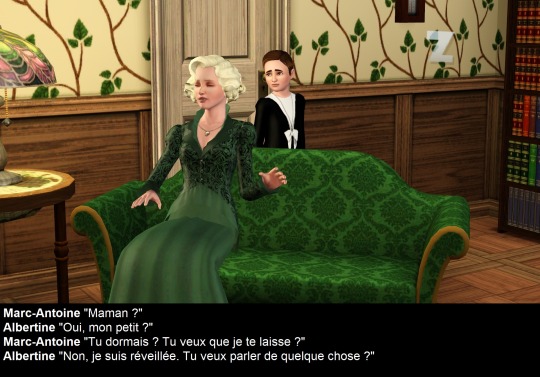
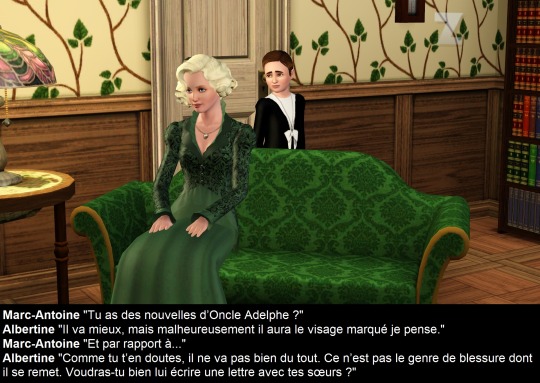
Printemps 1917 - Champs-les-Sims
1/7
Cher cousin,
C'est avec le coeur lourd que je vous écrit cette lettre. La tragédie que nous redoutions temps a fini par frapper, mais là où ne nous y attendions pas, ce qui ajoute à notre malheur.
Juste après le nouvel an, alors que son régiment stationnait à Avoncourt, Adelphe a été touché par une balle incendiaire au visage. Il n'est heureusement pas mort et n'a même pas perdu son oeil, ce que les médecins considèrent comme miraculeux. Alors que nous étions soulagés qu'il s'en sorte avec une simple cicatrice, c'est alors que le véritable drame a frappé. Le jour où il nous adressait la lettre informant son épouse de son rétablissement, Marie a été amenée à l'hôpital pour accoucher. Aveuglés par notre soulagement, nous avons éclaté en sanglot quand Madame Eugénie est revenue en nous annonçant que ma chère belle-soeur est morte en mettant au monde la petite Jeanne.
Transcription :
Marc-Antoine « Maman ? »
Albertine « Oui, mon petit ? »
Marc-Antoine « Tu dormais ? Tu veux que je te laisse ? »
Albertine « Non, je suis réveillée. Tu veux parler de quelque chose ? »
Marc-Antoine « Tu as des nouvelles d’Oncle Adelphe ? »
Albertine « Il va mieux, mais malheureusement il aura le visage marqué je pense. »
Marc-Antoine « Et par rapport à... »
Albertine « Comme tu t’en doutes, il ne va pas bien du tout. Ce n’est pas le genre de blessure dont il se remet. Voudras-tu bien lui écrire une lettre avec tes sœurs ? »
#lebris#lebrisgens4#history challenge#legacy challenge#sims 3#decades challenge#nohomechallenge#ts3#simblr#sims stories#eugénie le bris#Albertine Maigret#Jules Le Bris#Marc-Antoine Le Bris#Adelphe Barbois#Marie Ribeaucourt#Jeanne Barbois
7 notes
·
View notes
Note
Hey Cat 🐱 and Mouse 🐭 can I get help with a female fc with acting resources that could the sister or cousin of Maya Hawke? Someone between the ages of 22 to 30 if possible. If it helps, she is quite a plain jane (who’s still reasonably pretty) who’s quite smart too. Please and Thank you so much in advance! Also thank you so much for all your amazing work towards the roleplay community ♥️
Elizabeth Debicki (1990)
Britt Robertson (1990)
Iskra Lawrence (1990)
Elizabeth Debicki (1990)
Lou de Laâge (1990)
Alexandra Dowling (1990)
AJ Michalka (1991)
Sarah Bolger (1991)
Willa Holland (1991)
Jessica Barden (1992)
Lucy Fry (1992)
Elizabeth Lail (1992)
Ana Mulvoy-Ten (1992)
AnnaSophia Robb (1993)
Amanda Leighton (1993)
Freya Mavor (1993)
Saoirse Ronan (1994)
Lucy Boynton (1994)
Camille Razat (1994)
Dakota Fanning (1994)
Aislinn Paul (1994)
Grace Victoria Cox (1995)
Josefine Frida Pettersen (1996)
Sasha Pieterse (1996)
Kennedy McMann (1996)
Jeanne Goursaud (1996)
Kathryn Newton (1997)
Elena Kampouris (1997)
Madeleine Arthur (1997)
Alice Pagani (1998)
Alva Bratt (1998)
Benedetta Porcaroli (1998)
Olivia DeJonge (1998)
Lily Donoghue (1998)
Sophie Reynolds (1998)
Thank you so much for your kind words, anon!
4 notes
·
View notes